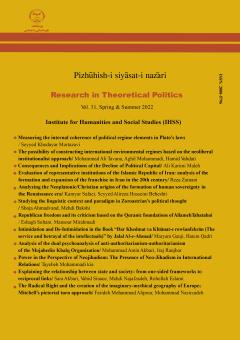Evaluation of representative institutions of the Islamic Republic of Iran: analysis of the formation and expansion of the franchise in Iran in the 20th century
Subject Areas : Research in Theoritical Politics
1 - Assistant Professor, Faculty of Economics, Allameh Tabatab’i University, Iran
Keywords: Franchise, political economy, social order, elections, and Iran.,
Abstract :
This paper has two major purposes: analyzing the franchise formation in Iran (1906-1911) and its expansionin the 20th century. All theories of the franchise are categorized into six groups (enlightenment, party competition, the middle class will, redistribution, social order, and political economy). Based on these theories, it has been shown that in the early period of the formation of elections in Iran, the trade union elections (1285) had a redistributive function and in contrast to the one-degree elections of 1290, had an enlightening function.With attention to mentioned theories, we found that the franchise adjustment in Iran in the 20th century does not have a fixed and linear trend and this level of access has varied over time. Moreover, it has been shown that both after and before the Islamic revolution, franchise expansion in Iran is compatible with both social order and redistribution theories.
آبراهاميان، يرواند (1389) ايران بين دو انقلاب: درآمدي بر جامعهشناسي ايران معاصر، ترجمه احمد گلمحمدي و محمدابراهيم فتاحي، تهران، ني.
حبیب¬نژاد، سید احمد (1390) «شرایط انتخاب¬شوندگی در انتخابات مجلس شورای اسلامی در نظام حقوق اساسی ایران با نگاهی تطبیقی»، علوم سیاسی، شماره 55، صص 99-129.
دانایی فرد، حسن و دیگران (1388) روش¬شناسی پژوهشهای کیفی در مدیریت: رویکری جامع، چاپ سوم، تهران، صفار.
سائلی کرده ده، مجید (1378) سیر تحول قوانین انتخاباتی مجلس در ایران، تهران، مرکز اسناد انقلاب اسلامی.
سلطانیان، ابوطالب و طاهره شمسی (1395) «بررسی نخستین قانون انتخابات و کیفیت استقرار نخستین مجلس مشروطه در ایران»، مطالعات حقوق عمومی، شماره 46، صص 491-۵۱۰.
سلیمی، ابتهاج و دیگران (1399) «عوامل مؤثر، روند و پیامدهای انتخابات مجلس چهاردهم شورای ملی در کرمانشاه»، پژوهشهاي ايرانشناسي، دوره دهم، شماره 2، صص 91-112.
طحان نظیف، هادی و سجادقلیچ¬پور (1400) «آسیب¬شناسی تعیین شرایط داوطلبان نمایندگی مجلس در پرتو قانون اساسی و سیاستهای کلی انتخابات»، دانش حقوق عمومی، شماره 31، صص 19-42.
طولابی، توران (1396) «مواجهه نظم کهن و نظم جدید در تجربه مشروطیت: نمونه انتخابات زنجان در دوره چهارم مجلس شورای ملی»، پژوهشهای تاریخی، دوره نهم، شماره سه، صص 207-226.
کاتوزيان، محمدعلي (1387) اقتصاد سياسي ايران: از مشروطيت تا پايان سلسله پهلوي، ترجمه محمدرضا نفيسي و کامبيز عزيزي، چاپ چهاردهم، تهران، مرکز.
کسروی، احمد (1363) تاریخ مشروطه ایران، چاپ شانزدهم، تهران، امیرکبیر.
مجيدي، عبدالمجيد (1381) «خاطرات عبدالمجيد مجيدي، وزير مشاور و رئيس سازمان برنامه و بودجه (۱۳۵6-۱۳۵1)»، ويراستار حبيب لاجوردي، تهران، گام نو.
Acemoglu, D. , S. Johnson, and J. Robinson (2000) why did the western extend the franchise? Inequality and Growth in Historical Perspective, The Quarterly Journal of Economics.
------------------------------------------------------ (2005) Institutions as a Fundamental Cause of Long-Run Growth. In P. Aghion and S. N. Durlauf. (2005) Handbook of Economic Growth, Elsevier North-Holand, Amesterdam.
Collier, Ruth B. (1999) Paths towards Democracy: The Working Class and Elites inWestern Europe and South America (New York: Cambridge University Press). Cowling, Maurice (1967) Disraeli, Gladstone and Revolution (Cambridge, UK Cambridge University Press).
Jorgensen-Earp, Cheryl R. (1997) The Transfiguring Sword: The Just War of theWomen’s Social and Political Union (Tuscaloosa: University of Alabama Press).
Lee, Stephen J. (1994) Aspects of British Political History, 1815–1914, London, UK Routledge.
North, D. C., Wallis, J. J., & Weingast, B. R. (2009) Violence and social orders: A conceptual framework for interpreting recorded human history. Cambridge University Press.
Searle, Geoffrey R. (1993) Entrepreneurial Politics in Mid-Victorian Britain, Oxford, UK Oxford University Press.
Tilton, Timothy A. (1974) The Social Origins of Liberal Democracy: The Swedish Case, American Political Science Review, LXVIII, 561–571.


